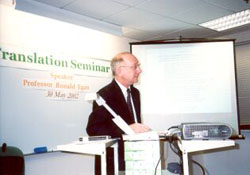Translation Seminar Series (Since 2001)
A Linguistic Approach to the Analysis of English Translations of Ancient Chinese Poems

The aim of the talk is to show how a linguistic approach can contribute to the study and analysis of translated texts. The talk will begin with some basic ideas in functional linguistics, which will be needed in later discussions. The examples to be illustrated are English translations of ancient Chinese poems (e.g. Tang poems).
淺論譯學詞典的編纂與研究
文獻學修養與譯學研究
譯介學研究的理論意義與實踐價值
On the Role of Discourse Analysis in Translation Studies – How to Make Discourse Analysis More Translation-oriented

Discourse analysis has drawn wide attention in translation studies in recent years. Researchers with varied positions on translation proper come to reach consensus on the necessity of carrying out discourse analysis in either translation studies or translation practices (including translator training and translation criticism).
當代中國譯學研究發展的回顧與展望
文化研究與翻譯研究
中國現代文學的整體維度
Translation as Metaphor: Yan Fu and the Confucian Dao

Yan Fu is best remembered for his translation of modern Western intellectual works and his epigrammatic “xin-da-ya” translation principles, generally taken to mean faithfulness to the original text, comprehensibility and elegance. It is a known fact that Yan’s translation agenda is highly purposeful and that many of his commentary-translations are not faithful to the original texts.
Text Analysis in Translation Studies: More than a Must
Some Reflections on David Hawkes’ Translation of Honglou Meng

David Hawkes’ translation of the first eighty chapters of Honglou Meng 《紅樓夢》 (The Story of the Stone) is justly acclaimed as a masterpiece of literary translation from the Chinese. In this presentation, an attempt will be made to characterize the distinctive features of Hawkes’ methods as a translator.
Metaphor, Transference, and the Problem of Translatability

In the etymological sense, both metaphor and translation signify an act of transference, of carrying something across, and that basic sense should help us understand the nature of translation. I shall discuss a number of important theoretical and critical discussions of the problem of translation, and of translatability in particular, and I shall argue for translation not just as a technical issue of finding equivalence between languages, but first and foremost the necessary means of understanding and communication across the gaps of cultures, histories, and traditions.
On a Pseudo-subversive Use of Corpora in Translator Training and Scholarship

The use in translation studies of methodologies inspired by corpus linguistics has proved to be one of the most important gate-openers to progress in the discipline since Toury’s re-thinking of the concept of equivalence. In this paper, I argue that, the many advantages to be had by this method notwithstanding, there are problems.
When is Textual Inaccessibility a Communicative Virtue?

The linguistic and rhetorical norms of the target language and culture have always been a crucial element in the theory and practice of translation. These preferences invariably compete with another set of textual norms already in place as part of the language user’s rhetorical competence. Included here are such variables as educational background, orate vs. literate predilections, mother tongue’s linguistic/rhetorical preferences, etc.
The Mutual Neglect of Lexicography and Translation

The speaker will ask why these two disciplines have stood apart for so long and what can be done to bring about a rapprochement between them. The relative neglect of interlingual topics in lexicography and of lexicographic topics in translation will be demonstrated, and the special case of parallel text analysis will be examined to show how progress in interdisciplinary collaboration can be made.
An Application of the Polysystem Theory to the Study of Translators
Translation as Social Representation: A Model for Translation Criticism

There is a need for a better understanding of what structures the relationship between the (translating) subject and the object (matter) of translation. What are the cultural parameters of this relationship? A culture that creates a demand for translation also supplies a framework of references (ideas, beliefs, and values) which accompany the subsequent interpretation of the text in that culture.
系統理論對翻譯文學(史)研究的啟示──兼談比較文學的翻譯研究方法用

伊塔瑪‧埃文-佐哈爾 (Itamar Even-Zohar)、吉迪恩‧圖裏 (Gideon Toury)、安德烈‧勒菲弗爾 (Andre Lefevere)、西奧‧赫曼斯 (Theo Hermans) 等人的系統理論開創了以譯文為中心、從譯語文化角度研究文學翻譯的新範式。系統理論不僅可以為研究某一時期的文學翻譯現象或翻譯文學史提供一個宏觀的理論構架,而且它的一些關鍵詞(核心概念),如“多元系統” (polysystem)、“意識形態” (ideology)、“重寫” (rewriting)、“操縱” (manipulation)、“形式庫” (repertoire)、“動態經典” (dynamic canons) 等等,也可作為對具體現象分析的理論視點。












